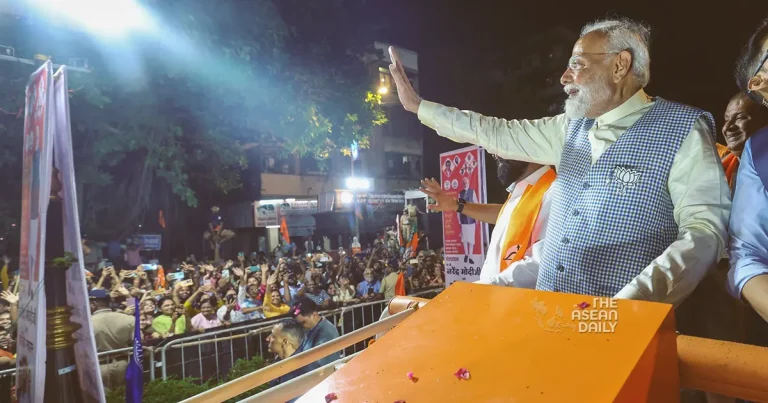4-6-2024 (MUMBAI) India’s Prime Minister Narendra Modi claimed victory for his party and its allies in the recently concluded general elections on Tuesday (Jun 4). However, the opposition camp swiftly responded, asserting that they had “punished” the ruling party by confounding predictions and reducing their parliamentary majority.
“People have placed their faith in NDA (National Democratic Alliance) for a third consecutive time,” Modi declared on the social media platform X, as vote counting neared completion on Tuesday night.
While the results confirmed Modi’s alliance as the winner, the margin of victory was surprisingly narrow, defying expectations. Unlike the previous two elections, Modi’s Hindu nationalist Bharatiya Janata Party (BJP) will need the support of its alliance partners to cross the 272-seat majority mark in the 543-seat lower house of parliament, according to the running vote count.
Modi had set an ambitious target of securing more than 400 seats for his National Democratic Alliance, but the alliance is currently leading in only about 290 seats, according to data from the Election Commission, with approximately three-quarters of the vote count completed.
The BJP itself was leading in 239 seats, a significant decrease from the 303 seats it secured in the 2019 elections, prompting analysts to suggest that the party’s reliance on allies to form the government is a “slap in the face.”
“The BJP’s reliance on allies to form the government is a slap in the face,” said Milan Vaishnav, a political analyst at the Carnegie Endowment for International Peace think-tank in Washington. “At this stage, NDA allies will extract their pound of flesh, which will have an impact not just in terms of policymaking but also in terms of the composition of the cabinet. (Earlier) the BJP could dictate terms with very little regard for its coalition partners.”
Modi, known for his strong leadership, has not had to rely heavily on alliance partners in the past, and it remains to be seen how easily he will adapt to this new dynamic.
The BJP’s numbers were likely pulled down by the party’s poor performance in the country’s most populous state, Uttar Pradesh, which sends 80 lawmakers to parliament. The party was leading in only 33 seats in the state, a significant decrease from the 62 seats it won there in 2019. Analysts attribute this decline to the party’s failure to address bread-and-butter issues, which overshadowed its appeal to the Hindu majority, even with the inauguration of a grand temple to the Hindu god-king Lord Ram in January.
On the other hand, the opposition INDIA alliance, led by Rahul Gandhi’s centrist Congress party, performed better than expected, leading in over 230 seats. Congress alone was leading in nearly 100 seats, almost double the 52 it won in 2019 – a surprising jump that is expected to boost Gandhi’s standing.
“The country has unanimously and clearly stated, we do not want Narendra Modi and Amit Shah to be involved in the running of this country, we do not like the way they have run this country,” Gandhi told reporters, referring to Modi’s powerful number two, Home Minister Shah. “That is a huge message.”
Gandhi further stated that Congress would hold talks with its allies on Wednesday and decide on the future course of action when asked if the opposition would attempt to form a government.
The seven-phase poll, which began on Apr 19 and concluded on Jun 1, was a staggering exercise in logistics, with more than 640 million votes cast in the world’s largest democratic process. Voting was held across megacities like New Delhi and Mumbai, as well as in sparsely populated forest areas and the high-altitude territory of Kashmir, with temperatures reaching nearly 50 degrees Celsius in some parts.
Nearly 970 million people, more than 10 percent of the world’s population, were eligible to vote, and the average turnout across the seven phases was 66 percent, just one percentage point lower than the previous election in 2019, squashing pre-poll concerns of voter apathy.
During his decade in power, Modi has transformed India’s political landscape. While his supporters view him as a self-made, strong leader who has improved India’s standing in the world and credited his pro-business policies with making the economy the world’s fifth-largest, his critics and opponents argue that his Hindu-first politics have bred intolerance, hate speech, and brazen attacks against the country’s minorities, particularly the Muslim population, which comprises 14 percent of the population.




